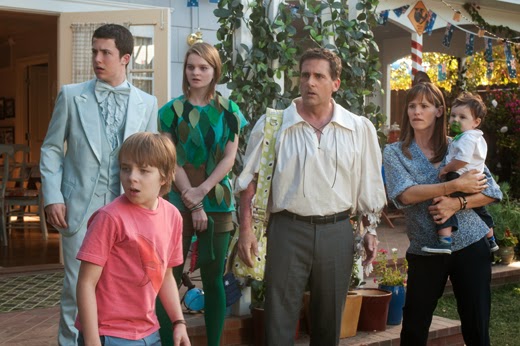4.5 stars. Rated R, for relentless profanity, sexual candor and brief violence
By Derrick Bang • Originally published in The Davis Enterprise, 10.31.14
This isn’t merely a movie; it’s a
bravura display of cinematic pizzazz as mesmerizing as its three starring performances.
This one demands repeat viewing.
First time out, you’ll be overwhelmed by the stylistic approach — dazzlingly
so, to the point of wanting to applaud — and then you’ll need a second round to
better appreciate everything else going on.
We’ve never seen anything quite
like this.
Granted, director/co-scripter
Alejandro González Iñárritu borrows respectfully from predecessors going all
the way back to Robert Wiene (1920’s silent The Cabinet of Dr. Caligari),
with strong nods toward Alfred Hitchcock (1948’s Rope), Roman Polanski (1965’s Repulsion) and Paddy Chayefsky (1976’s Network).
Much more recently, Joe Wright
attempted similar cinematographic trickery with 2012’s Anna Karenina, but
with far less success; the stage-bound stylization called too much attention to
itself, at the expense of the story.
But that, too, is the genius of
Iñárritu’s Birdman: The audacious approach is part of the story, indeed the
throbbing heartbeat of an exhilarating descent into artistic madness, whose
pulse is amplified by a score devoted solely to Grammy Award-winner Antonio
Sanchez’s percussive drumming.
That latter affectation is
jarring at first, particularly as Sanchez’s efforts become pervasive, his
shifting tempos altering the story’s rhythm and pace in a manner normally
handled by cutting wizardry. But editors Douglas Crise and Stephen Mirrione
seemingly have very little to do in this film, because cinematographer Emmanuel
Lubezki’s brilliantly composed scenes are — like our central character’s relentless
fever dream — one long tracking shot.
Yep. For 119 minutes. Over the
course of this narrative’s roughly three days and nights.
Not entirely true, of course,
which is why that word — seemingly — is so crucial. Despite having the
appearance of a single extended take, Iñárritu, Lubezki, Crise and Mirrione
collaborate quite cleverly to convey this illusion ... just as everything that
happens on a Broadway stage is pure artifice.
Except when it isn’t, which is
the whole point here. Even before we dive into his rapidly unraveling psyche,
Riggan Thomson (Michael Keaton) has lost the ability to separate his actual
life from what takes place on stage; his performer’s artifice may be the only
thing helping him cling to whatever remains of his sanity. Indeed, how many
actors, stretching back centuries, have insisted that they only come alive each
night, when they hit their marks ... their vivid, full-color nighttime dreams
far more real to them than the washed-out black-and-white of their actual
lives?









